Leafy greens come to mind as people think about nutritious foods that help them lose weight. Spinach is one of the most common leafy greens on the planet.
It’s so common, in fact, that it’s included in the recipes of a number of high-quality cat food manufacturers.
Cats can actually consume spinach because it can act as a substitute product of a complete meal.
Cats, on the other hand, are carnivores. This means they shouldn’t eat those things if they depend on meat to survive, right?
And if it isn’t substantial enough to substitute beef, spinach is one of the things that can provide vital nutrients for your cat.
While we’re on the topic of those foods, check out some of the human super-foods that cats can easily consume.
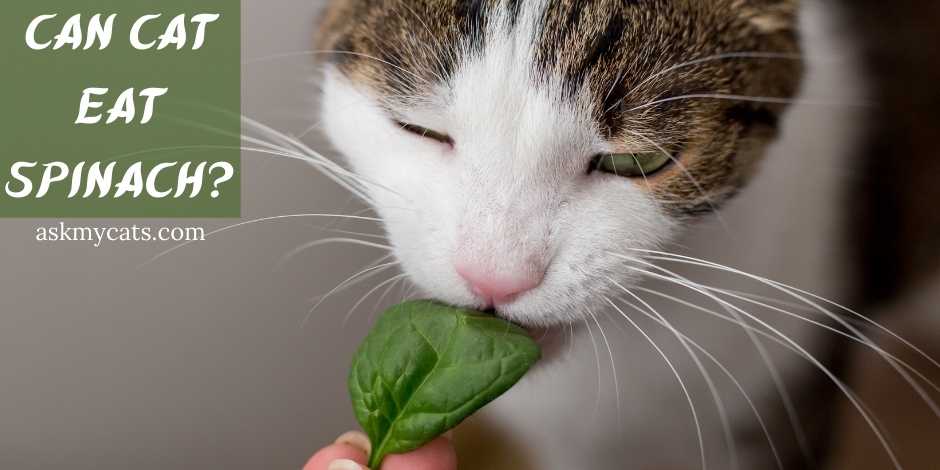

Give Your Cat the Perfect Day
Get the Free Ebook!
Is Spinach Good For Cats?
Yes, spinach is useful to feline furballs in a variety of respects. That’s why many pet food companies use trace quantities of spinach in their recipes.
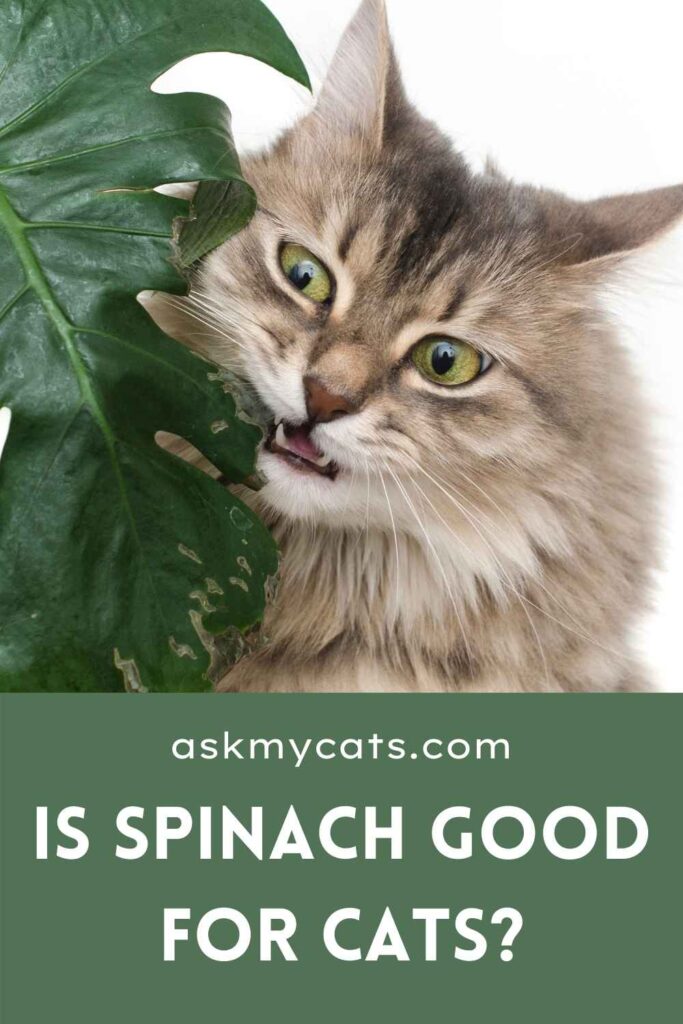
Here are a few of the most important benefits of spinach for cats.
Vitamins and minerals abound. Even the tiniest portions of spinach are high in vitamins A, K, B6, B2, E, and C.
This leafy green is also high in magnesium, folate, calcium, and potassium, which are all necessary nutrients.
One of the many advantages of spinach is that it is low in calories. Another explanation why having it in your pet’s diet is beneficial for weight control is because of the fibre content.
It provides a decent source of fibre. In addition to other crops, spinach has a moderate amount of fibre.
It can, however, encourage good digestive health in cats, particularly those who suffer from constipation.
If your cat eats small quantities of spinach (such as those used in commercial cat foods), the vegetable will not cause diarrhoea but will aid in overall digestion.
Omega-3 fatty acids are also present. Don’t get me wrong: spinach isn’t some magical low-calorie, high-healthy-fats vegetable. It doesn’t have nearly as much Omega-3 as salmon or fish oils, so it’s not as healthy. Nonetheless, it is advantageous.
Can Spinach Be Bad For Cats?
No, it’s not a good idea to feed spinach to cats that have urinary issues.
Calcium olaxate is found in this leafy green. It can cause toxic crystals to form in your pet’s urinary tract, which can lead to further complications.
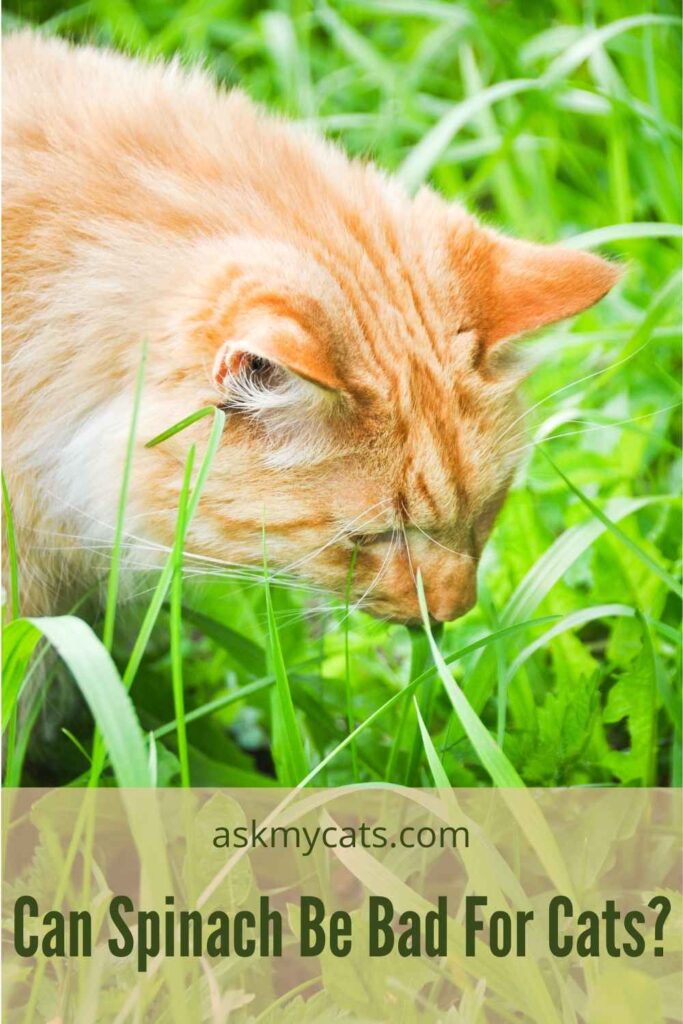
In certain circumstances, spinach can be harmful to cats. Although it isn’t harmful to feline furballs, it may exacerbate some health issues.
However, if the cat is otherwise stable and has no urinary tract issues, the small quantities of calcium olaxate in spinach would not affect it.
You can see why I cautioned you about the lack of a straightforward yes or no answer now that we’ve gone through the benefits and drawbacks of spinach.
However, there are a few basic pointers that summarise all.
Don’t send spinach to your pet whether it has urinary tract infections or kidney complications now or in the past.
The tiny levels of calcium oxalate present are insufficient to damage an otherwise stable adult cat.
They can, however, damage a furball who is healing or has completely recovered from certain health issues.
Regardless of the number, I don’t believe spinach is sufficient for a daily diet.
When fed in moderation, spinach will provide a nutritious boost to your fuzzy friend’s body. Unfortunately, increasing the dosage would not improve the nutritional value of this vegetable.
It can’t take the place of beef or fish as a main source of nutrition. Furthermore, consuming so much of it will result in indigestion.
Can My Cat Eat Raw Spinach?
Yes, raw spinach leaves are just as safe for cats as their cooked counterparts. If you’re adding cooked spinach to your pet’s food, don’t apply some seasonings, sauces, or toppings because they might induce a chemical reaction.
You might be wondering which is the best choice between cooked and raw spinach now that we’ve looked at the benefits and drawbacks of feeding your cat spinach.
The presence of oxalates in raw spinach is the major issue. As previously said, this can result in urinary tract crystals as well as a chance of kidney stones.
Feeding raw spinach to your cat is a no-no and your cat may be suffering from an underlying health problem that you are unaware of.
The below are some of the signs and symptoms of kidney stones.
- Urination is either regular or infrequent.
- Vomiting and nausea
- Appetite loss and oil depletion
- It’s a fever
- Blood in the faeces, and sometimes in the stool
- Pains in the abdomen
- Infection of the urinary tract
- Weight loss that occurs suddenly due to an inability to feed.
Can Cats Eat Cooked Spinach?
Yes, you can feed your cat cooked spinach because they are very healthy to eat.
If you wish to use spinach in your cat’s diet, the only way to do so is to prepare it first. The manner in which you prepare the vegetable is also crucial.
Boiling or steaming spinach is the easiest way to prepare it for your pet. Cooking in this manner preserves the majority of the essential nutrients.
If you want to boil, make sure you don’t add any pepper, salt, spices, or anything else that may be harmful to your cat’s welfare.
Tiny quantities of spinach can be mixed with your cat’s daily meal, according to the manufacturer’s instructions.
Spinach can be eaten raw or cooked by your pet.
And if you like your spinach fried, your cat would eat it raw or cooked.
Raw spinach resembles the lawn your cat would find outdoors. When chewed, it has a leafy texture that turns into a paste. This is the most straightforward alternative.
Your pet, on the other hand, will eat cooked spinach. If you should decide to prepare spinach for your cat, avoid using oil, salt, or spices.
Oil and salt, for example, will make the spinach unsafe for your pet. If you want to give your cat cooked spinach, steaming it is the best choice.
How Much Spinach Should I Feed My Cat?
You should always feed your cat spinach in very small proportions to avoid health hazards.
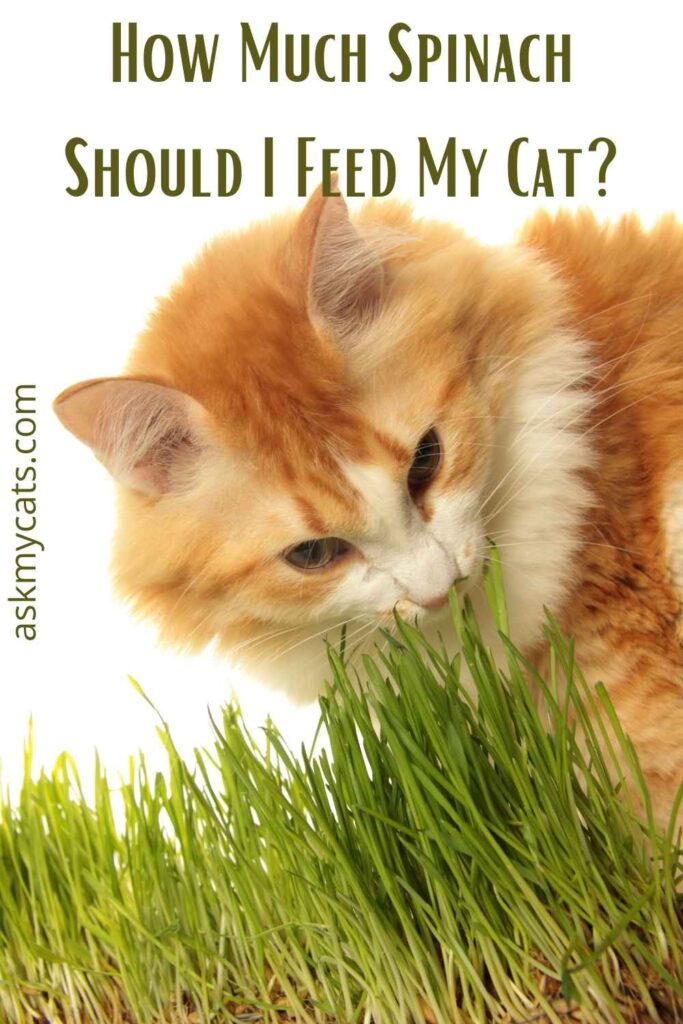
You may be wondering, “How much spinach can I feed my cat?” You should never offer them large amounts of food at one time.
When first starting out, give them a small amount and see whether they can even eat it. Cats are notorious for being picky eaters.
Even if your cat likes spinach and reacts well to it, you can just give it to them in small amounts, such as a leaf or two every now and then.
Cats are carnivores, and spinach is not a necessary part of their diet to keep them alive. It provides a lot of extra calories for your cat, but it can never be used in lieu of their daily diet.
If your cat has or has ever had a urinary tract infection or kidney complications, never give them spinach. There are other healthier options available, or you can just adhere to a normal cat diet.
If your cat is well and has never had a urinary tract infection, you should feed them tiny quantities of spinach, just make sure to prepare it first by boiling or steaming it.
Often seek the approval of a doctor before adding spinach or something else to your cat’s diet.
Despite the fact that it might not be dangerous, the reaction and recommendation is a resounding no. Kittens are much more fragile than adult cats because they are not fully grown.
Kittens drink milk from their mother before they reach a certain age. There is also special kitten food available that is a great option for your pet.
It’s not uncommon to see a cat begging for food from humans. Neither is the sight of the cat owner gladly selling the feline human food.
Most pet owners are unaware that cats’ digestive systems vary significantly from those of humans. As a result, doctors usually advise pet owners against feeding their pets human diets.
What Greens Can Cats Eat?
Greens are healthy for your pet, just as they are for humans.
Although leafy greens are similar to the grass that cats consume outdoors, there are other green vegetables that can be beneficial to your pet.
Green vegetables have many health benefits for your cat, but they should not be the focus of your cat’s diet. Humans can live on a vegetarian diet, but cats are carnivores that require meat.
A proper diet necessitates the consumption of meat by cats in order for them to be as stable as possible.
It is better to steam foods that are typically eaten fried, such as broccoli, asparagus, and green beans, for your pet. Avoid adding extra additives like salt or oil to keep them as fresh as possible.
If you want to feed your cat leafy greens, you don’t have to limit yourself to spinach.
Since spinach has so many human health benefits, you can believe it is the best green to feed your cat. Here are a few other possibilities:
Cat grass is a kind of grass that grows in pots within your house.
Lettuce is a popular option and you’re likely to have plenty on hand.
Standard grass from the yard, as simple as it might be, even aids your cat’s digestion.
Spinach is an excellent alternative for your pet, but if you don’t have any (or don’t care for it); there are other common choices for your cat to consume.
Do Cats Love Spinach?
Yes, cats love spinach because cats, on the other hand, enjoy experimenting with new diets every now and again.
It’s one thing to love spinach and another to know if it’s okay for your cat to eat it.
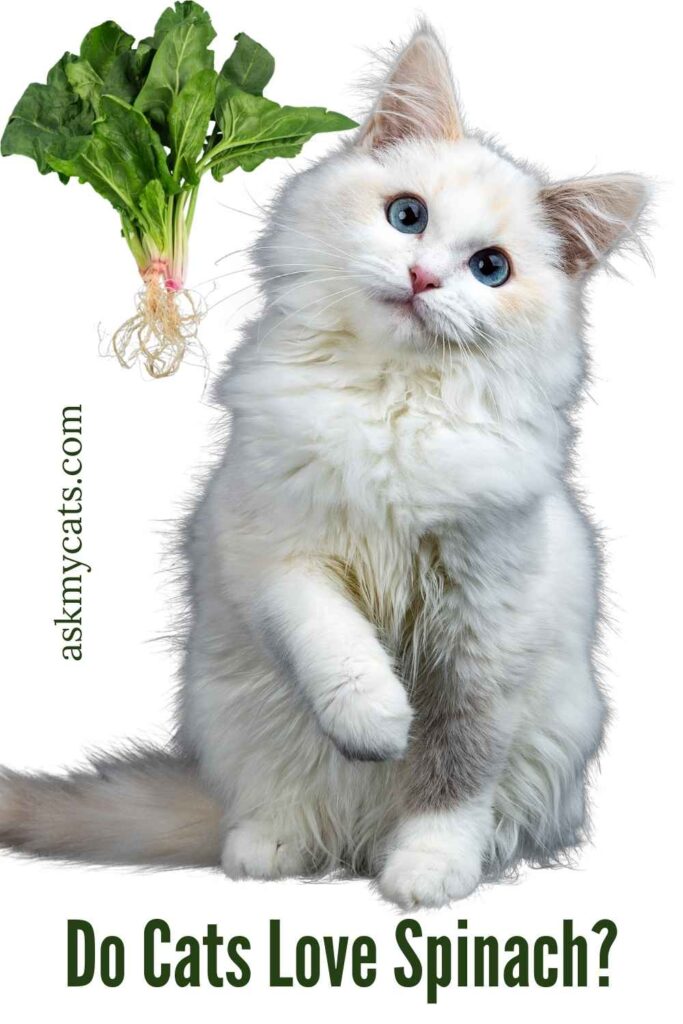
In an ideal world, cats are picky eaters. Since they are carnivorous creatures, they are unlikely to think for food.
If you have several cats, you’ve already found that each one has their own personality, interests, and dislikes. So it’s difficult to say if your cat enjoys spinach.
If you want to know if your cat likes spinach, the best way to find out is to give it some and see how it reacts.
If there’s no need to be concerned if your cat ate a small amount of spinach, it’s best not to feed it to your cat on a regular basis.
Spinach is known to be such a nutritious snack for humans that it is often referred to as “superfood.” However, spinach is not a healthy treat for cats.
Spinach is known to be such a nutritious snack for humans that it is often referred to as “superfood.” However, spinach is not a healthy treat for cats.
The conclusion is, unfortunately, no. The trouble with spinach for cats is that it has a low calcium oxalate content, which can induce crystal formation in the urinary tract.
Frequently Asked Questions
What Greens Can cats eat?
Chopped carrots, peas, frozen corn, broccoli florets, green beans, zucchini, lettuce, spinach, winter squash, and pumpkin are also excellent vegetables to feed your pet. Since felines, like humans, lack the ability to break down plant cell walls, this produce should be cooked (steamed is best).
What vegetables are bad for cats?
Onions, garlic, shallots, and scallions will kill red blood cells in your cat, resulting in anaemia. These foods are poisonous when consumed in significant amounts, but condensed sources of onion or garlic, such as onion soup mix or garlic powder, can also be harmful.
Final Words
Cats benefit greatly from spinach. Cats, on the other hand, depend on animal protein to survive. Fruits and vegetables can only be served as a special treat.
When it comes to spinach, you should be extra cautious because large quantities of the vegetable can be dangerous.
Spinach contains oxalates, which have been shown to have negative effects on a cat’s renal and digestive systems.
As a result, the safest way to feed spinach to cats is in small amounts. Better still; seek advice from your veterinarian before adding the vegetable to your cat’s diet.
If you have any more questions, please post them in the section below.
